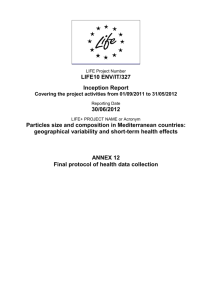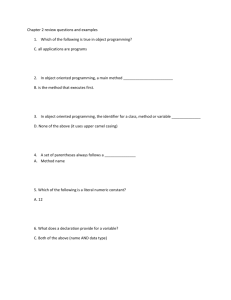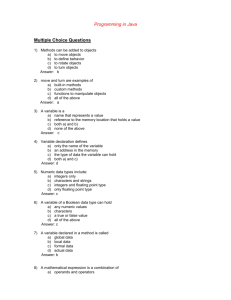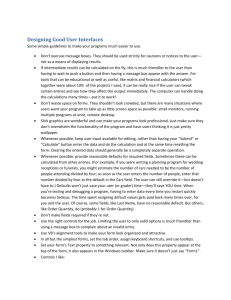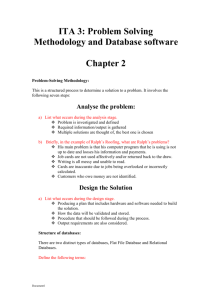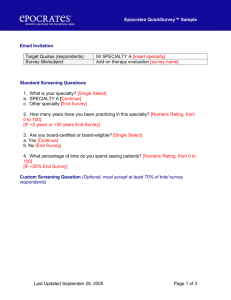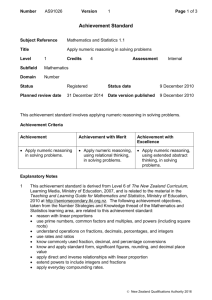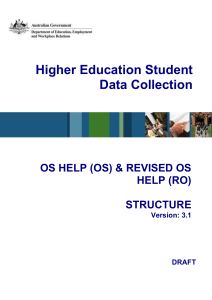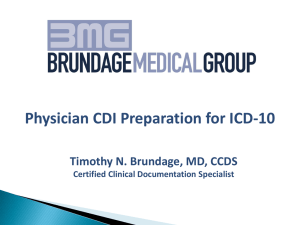Final protocol for the data collection on daily mortality and
advertisement
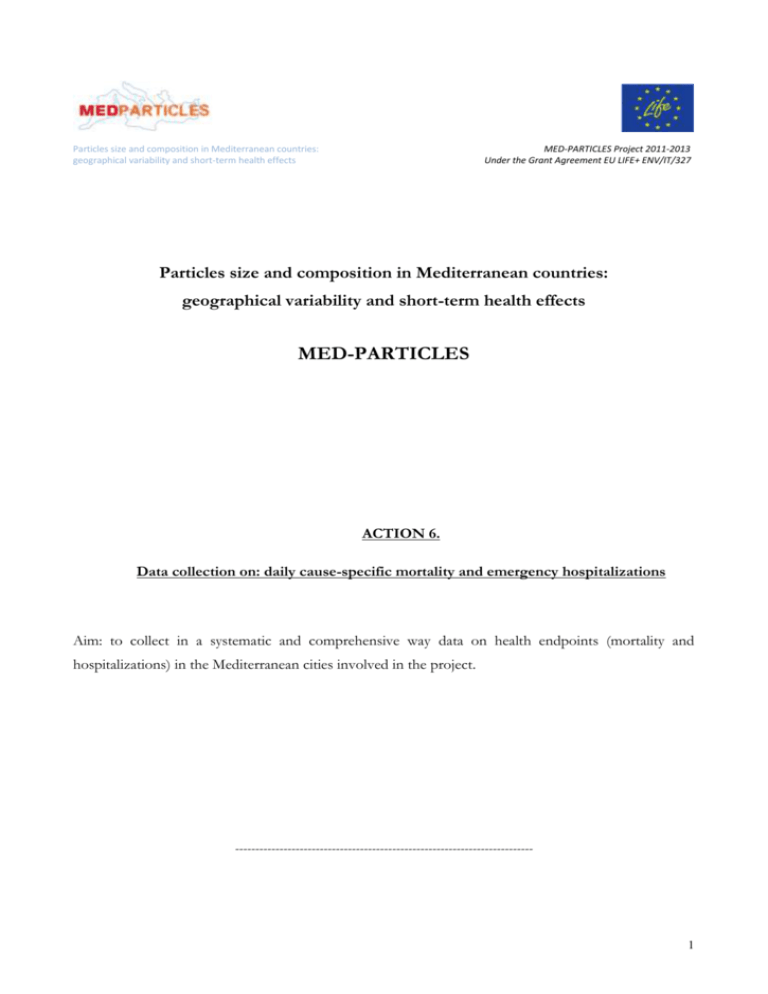
Particles size and composition in Mediterranean countries: geographical variability and short-term health effects MED-PARTICLES Project 2011-2013 Under the Grant Agreement EU LIFE+ ENV/IT/327 Particles size and composition in Mediterranean countries: geographical variability and short-term health effects MED-PARTICLES ACTION 6. Data collection on: daily cause-specific mortality and emergency hospitalizations Aim: to collect in a systematic and comprehensive way data on health endpoints (mortality and hospitalizations) in the Mediterranean cities involved in the project. -------------------------------------------------------------------------- 1 Objective To collect the relevant health data to estimate the effects of particles sizes and their components on human health, also evaluating the potential for an effect modification of Saharan dust and forest fires episodes. The health endpoints of interest in the MED-PARTICLES project will be total, cardiac, cerebrovascular and respiratory mortality, as well as emergency hospitalizations for specific causes, namely all cardiovascular and respiratory diseases as well as specific diseases entities like myocardial infarction, heart failure, respiratory infections and chronic obstructive pulmonary diseases (COPD). The outcomes at the individual level, where available, will be pooled for each day to get the daily counts of deaths/hospitalizations, by age group, gender and cause/diagnosis, which will be put in relationship with daily air pollution measurements to estimate short-term effects. The data collection will be performed at the center-level and finally the city-specific data will be pooled centrally (Action 7). The anonymity of all the subjects included in the final databases is guaranteed, in compliance with country-specific regulations. Methods Mortality data For each city involved in the project, and for each day of the study period, data on daily mortality counts will be collected with regards to the population resident of the city and died within the city. Daily counts will be collected for specific groups of causes of death, for specific age groups (0-14, 1534, 35-64, 65-74, 75-84, 85+), and separately for men and women. The following causes of death will be considered, with relative ICD-9 and ICD-10 codes: 2 Cause of death ICD-9 code ICD-10 code Natural causes 001-799 A00 – R99 Diabetes 250 E10 – E14 Cardiovascular diseases 390-459 I00 – I99 Cardiac diseases 390-429 I00 – I52 Acute coronary events 410-411 I21 – I23 Conduction disorders 426 I44 – I45 Arrhythmias 427 I46 – I49 Heart failure 428 I50 430-437 I60 – I68 460-519 J00 – J99 466, 480-487 J09 – J18, J20 – J22 Acute bronchitis, bronchiolitis, unsp. LRTI 466 J20 – J22 Pneumonia 480-486 J12 – J18 Influenza 487 J09 – J11 Cerebrovascular diseases Respiratory diseases Low respiratory tract infections (LRTI) Chronic obstructive pulmonary disease (COPD) 490-492,494,496 J40 - J44, J47, 3 In summary, the following dataset will be produced (named “city_mortality_YYbeg_YYend”), with corresponding code book as detailed below (replace “city” with the name of the city, “YYbeg” with the year of beginning of the time-series, and “YYend” with the year of end of the time-series): Variable Format Description city Character Name of the city yy Numeric Year of death mm Numeric Month of death dd Numeric Day of death m014nat Numeric Daily count of deaths for natural causes, age 0-14, males f014nat Numeric Daily count of deaths for natural causes, age 0-14, females m1534nat Numeric Daily count of deaths for natural causes, age 15-34, males f1534nat Numeric Daily count of deaths for natural causes, age 15-34, females m3564nat Numeric Daily count of deaths for natural causes, age 35-64, males f3564nat Numeric Daily count of deaths for natural causes, age 35-64, females m6574nat Numeric Daily count of deaths for natural causes, age 65-74, males f6574nat Numeric Daily count of deaths for natural causes, age 65-74, females m7584nat Numeric Daily count of deaths for natural causes, age 75-84, males f7584nat Numeric Daily count of deaths for natural causes, age 75-84, females m85nat Numeric Daily count of deaths for natural causes, age 85+, males f85nat Numeric Daily count of deaths for natural causes, age 85+, females Replace “nat” with “diab” for diabetes Replace “nat” with “cvd” for cardiovascular diseases Replace “nat” with “card” for cardiac diseases Replace “nat” with “ace” for acute coronary events Replace “nat” with “cond” for conduction disorders Replace “nat” with “arrh” for arrhythmias Replace “nat” with “hf” for heart failure Replace “nat” with “cere” for cerebrovascular diseases Replace “nat” with “resp” for respiratory diseases Replace “nat” with “lrti” for LRTI Replace “nat” with “bron” for acute bronchitis, bronchiolitis, unspecified LRTI Replace “nat” with “pneu” for pneumonia Replace “nat” with “infl” for influenza Replace “nat” with “copd” for COPD 4 Hospitalization data For each city and for each day of the study period, data on daily hospitalization counts will be collected with regards to the population resident of the city and hospitalized within the city. Daily counts will be collected for specific groups of primary diagnosis, for specific age groups (0-14, 15-34, 35-64, 65-74, 75-84, 85+), and separately for men and women. Repeated events are allowed for each subject, however repeated hospitalizations within 28 days since the previous one and with the same primary diagnosis will be eliminated, under the assumption that the two events represent the same “episode” (Example: if a subject is discharged from a hospital with a primary diagnosis of acute myocardial infarction, ICD-9: 410, and s/he is re-admitted with the same diagnosis within 28 days since the discharge of the first hospitalization, the second hospital admission is not included among the study outcomes). Only ordinary (no day-hospital) and acute (no scheduled) hospitalizations will be considered, since the aim of the study is to investigate the association between daily pollutants concentrations and acute health outcomes. Finally, only the primary diagnosis will be considered for the identification of the outcome, unless specified differently. The following groups of primary diagnoses will be considered: Diagnosis of hospital discharge ICD-9 code ICD-10 code Diabetes 250 E10 – E14 Cardiovascular diseases 390-459 I00 – I99 Cardiac diseases 390-429 I00 – I52 410-411* I21 – I23 410* I21, I23 Conduction disorders 426 I44 – I45 Arrhythmias 427 I46 – I49 Heart failure 428 I50 430-437 I60 – I68 Hemorrhagic stroke 430-431 I60, I61 Ischemic stroke 434, 436 I63, I65, I66 460-519 J00 – J99 466, 480-487 J09 – J18, J20 – J22 Acute bronchitis, bronchiolitis, unsp. LRTI 466 J20 – J22 Pneumonia 480-486 J12 – J18 Influenza 487 J09 – J11 Acute coronary events Acute myocardial infarction Cerebrovascular diseases Respiratory diseases Low respiratory tract infections (LRTI) Chronic obstructive pulmonary disease (COPD) 490-492,494,496** J40 - J44, J47 Asthma J45-J46 493 5 * For these two specific outcomes, also secondary diagnoses will be used. Cases will be the hospitalizations with ICD-9: 410-411 (for acute coronary events) or 410 (for acute myocardial infarction only) as the primary diagnosis, or the hospitalizations with ICD-9: 410-411 (or 410) as the secondary diagnosis and a complication of the coronary syndrome as the primary one. Complications of the coronary syndrome (and of the myocardial infarction) include: 427.1 Paroxysmal ventricular tachycardia I472 427.41 Ventricular fibrillation I490 427.42 Ventricular flutter I490 427.5 Cardiac arrest I46 428.1 Left heart failure I501 429.5 Rupture of chordae tendineae I511 429.6 Rupture of papillary muscle I512 429.71 Acquired cardiac septal defect I510 429.79 Other sequelae of myocardial infarction, not I258 elsewhere classified 429.81 Other disorders of papillary muscle I512 518.4 Acute edema of lung, unspecified J81 780.2 Syncope and collapse R55, R579 785.51 Cardiogenic shock R570 414.10 Aneurysm of heart (wall) I253 423.0 Hemopericardium I312 ** For this specific outcome, also secondary diagnoses will be used. Cases will be the hospitalizations with ICD-9: 490492,494,496 as the primary diagnosis, or the hospitalizations with ICD-9: 490-492,494,496 as the secondary diagnosis and a complication of the COPD as the primary one. Complications of the COPD include: 518.8 Other diseases of lung J98 518.5 Pulmonary insufficiency following trauma and J96, J80, J95 surgery 786.0 Dyspnea and respiratory abnormalities R06 In summary, the following dataset will be produced (named “city_hosp_YYbeg_YYend”), with corresponding code book as detailed below (replace “city” with the name of the city, “YYbeg” with the year of beginning of the time-series, and “YYend” with the year of end of the time-series): 6 Variable Format Description city Character Name of the city yy Numeric Year of hospital admission mm Numeric Month of hospital admission dd Numeric Day of hospital admission m014diab_h Numeric Daily counts of hospital admissions for diabetes, age 0-14, males f014diab_h Numeric Daily counts of hospital admissions for diabetes, age 0-14, females m1534diab_h Numeric Daily counts of hospital admissions for diabetes, age 15-34, males f1534diab_h Numeric Daily counts of hospital admissions for diabetes, age 15-34, females m3564diab_h Numeric Daily counts of hospital admissions for diabetes, age 35-64, males f3564diab_h Numeric Daily counts of hospital admissions for diabetes, age 35-64, females m6574diab_h Numeric Daily counts of hospital admissions for diabetes, age 65-74, males f6574diab_h Numeric Daily counts of hospital admissions for diabetes, age 65-74, females m7584diab_h Numeric Daily counts of hospital admissions for diabetes, age 75-84, males f7584diab_h Numeric Daily counts of hospital admissions for diabetes, age 75-84, females m85diab_h Numeric Daily counts of hospital admissions for diabetes, age 85+, males f85diab_h Numeric Daily counts of hospital admissions for diabetes, age 85+, females Replace “diab” with “cvd” for cardiovascular diseases Replace “diab” with “card” for cardiac diseases Replace “diab” with “ace” for acute coronary events Replace “diab” with “ami” for acute myocardial infarction Replace “diab” with “cond” for conduction disorders Replace “diab” with “arrh” for arrhythmias Replace “diab” with “hf” for heart failure Replace “diab” with “cere” for cerebrovascular diseases Replace “diab” with “hems” for hemorrhagic stroke Replace “diab” with “iscs” for ischemic stroke Replace “diab” with “resp” for respiratory diseases Replace “diab” with “lrti” for LRTI Replace “diab” with “bron” for acute bronchitis, bronchiolitis, unspecified LRTI Replace “diab” with “pneu” for pneumonia Replace “diab” with “infl” for influenza Replace “diab” with “copd” for COPD Replace “diab” with “asth” for asthma 7
